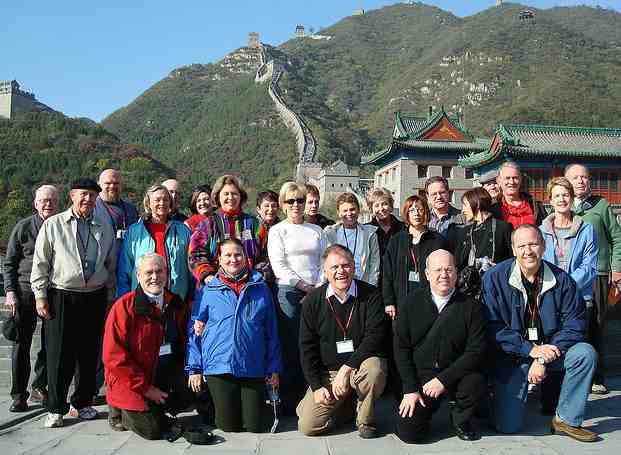20 Great Pieces Of Advice For Choosing China Tour Sites
Wiki Article
Top 10 Tips On Shopping At The Market On The Street In China
1. Arrive earlyTip. Market vendors will offer lower prices to first customers if they arrive at the market earlier.
Pro: Early shopping provides more options and greater bargaining opportunities.
Cons: Early mornings might not be suitable for everyone.
2. Bring Cash
You can pay with cash at many markets however mobile payment options like WeChat Pay or Alipay have gained popularity in recent years.
Cash payments can facilitate transactions and could provide leverage in negotiations.
Con: Carrying cash increases the risk of theft or loss in areas with high traffic.
3. Learn Basic Mandarin
Tip: Knowing phrases like "Zhege duoshao qian?" (How much is this?) Knowing phrases like "Pianyi duoshao ban" (Can I reduce the cost?) or 'Zhege doshao Qian?' will help you communicate effectively. It can help you effectively communicate.
Pros: Builds trust with vendors and displays respect for local culture.
Cons: The limited vocabulary could allow for miscommunications.
4. Be sure to inspect your belongings
Check for any defects or flaws, especially in electronics, clothing, and other handicrafts.
Pro: Ensure that you receive the item you're paying for, and avoid disappointment.
Cons: Can be time-consuming and vendors could be frustrated.
5. Bargain Confidently
Negotiations are commonplace at markets on the streets. Start by reducing the price 50-70 percent.
Pro: Bargaining can be a great way to reduce cost.
Con: It can be difficult for those who aren't experienced with the procedure.
6. Be wary of counterfeits
Be cautious when buying brand name items such as bags, watches and electronic devices.
Pro: Save money by avoiding low-quality copies.
Con Pros: Genuine products are difficult to find and cost more.
7. Local Customs to be Respected
Tip - Adapt your strategy by watching how locals negotiate and shop.
You can avoid cultural mistakes by mixing in.
Cons: It might take some time to understand all the traditions.
8. Keep Valuables Secure
Tip Use anti-theft totes or place your wallets and mobile phones in a secure pocket. This will help you not be robbed at busy markets.
Reduces the risk for theft in high traffic areas.
Cons: Extra precautions can feel as if they are limiting.
9. When buying food, taste it before you buy.
Take a look at samples of dried food or snacks before purchasing.
Pro tip: Make sure that you are happy with both the taste and the freshness of your food.
Cons: Some vendors may insist on buying after providing a free sample.
10. Know the market's focus
Tip: Every market has its own specialty, like the Yuyuan Market in Shanghai for souvenirs or Panjiayuan in Beijing for antiques. It is important to do your research ahead of time in order to reach your shopping goals.
Focusing on the right things and saving time.
Con: Limits spontaneity if you strictly adhere to your study.
The benefits of shopping at street markets
Unique Finds - You can find items in stores that aren't found elsewhere, such as local snacks and hand-crafted craft items.
Street markets usually have lower prices than malls stores or shopping centers.
Cultural Experience - Interacting with local vendors and exploring the markets is an opportunity to get a feel for the tradition.
Markets are a fantastic source of diverse items including food and clothing to gifts.
Cons of Shopping in Street Markets
copyright Products There is a high chance of encountering copyright or low-quality items.
The crowds at markets can be super busy during weekends and during holidays.
Vendors may push sales strategies. This can make the experience feel overwhelming.
There are no returns: Most purchases are final, with little recourse for refunds or exchanges.
You can stay clear of common pitfalls by following these tips and being prepared. Take a look at the recommended check out top attractions in this area for website recommendations including chinese stone lion the common ornament in chinese traditional architecture, shopping in tibet, chinese wood carving originated in neolithic period, some gifts from china, eating in dunhuang, wuxi a shining pearl of taihu lake, chinese wood carving originated in neolithic period, xiamen, the master of nets garden the hall of ten thousand books, biking tours and more.

Top 10 Tips To Make Seasonal Visits To The Temples Of Fame In China
1. Visit in Off-Season(Autumn/Winter).Tip. You should consider visiting the famous Chinese temples during times when the weather is cooler (usually from November to February). It is the time when there are less tourists and the weather is cooler.
Pro: A more peaceful experience, which is more tranquil and serene.
Con: The weather may be colder than usual, making temple tours in the outdoors less enjoyable.
2. Prepare yourself for extreme weather
Tips: Temperatures can be subject to a wide range of variations during the different seasons. Winters can be extremely cold, but summer temperatures are usually scorching. Pack according to the forecast for the weather.
The benefit is that you'll be prepared for any weather conditions, which will ensure comfort during your visit.
Con: Packing for seasonal extremes can be inconvenient, especially in the case of traveling in a small amount.
3. Visits in Spring and the summer to see Vibrant Flora
Tips: If you go to temples between spring and summer, you can enjoy beautiful gardens that are adorned with flowers in bloom and lush landscapes.
Pro: Gorgeous scenery adds to the aesthetic enjoyment of exploring the temple grounds.
Con The summer months in the United States can be very hot and overcrowded. This is particularly true on national holidays.
4. Take into consideration festivals, special events and Other Events
TIP: Plan your trip around traditional festivals like the Chinese New Year in January/February or the Mid-Autumn Festival in September. These periods offer festivities, rituals as well as the opportunity to observe the temple's vibrant culture activity.
Pro The temples are typically lively and full of traditional events, offering an experience unlike any other.
Con: Temples are very crowded, and accommodation prices can be high during festival periods.
5. Avoid Peak Holiday Seasons
Avoid visiting temples during high tourist seasons (e.g. Chinese Year of the Pig, Golden Week October) because they could be crowded.
Pros: Peaceful and tranquil visits with no crowds. Offers an experience of spirituality.
Con: You may not be able to attend some of the most exciting events during the festival when they're at their highest.
6. Be sure to check for winter Temple closures.
Some temples are closed or have restricted opening hours in winter. Be sure to check ahead.
It prevents you from making unnecessary journeys, and lets you plan your other things to do.
Con: There may be reduced hours of operation or temples completely closed during reconstructions.
7. Early Morning Visits in the summertime
Be sure to arrive early If you're visiting during summer to avoid the scorching heat of midday. Temples are usually open from the dawn hour, and it is quieter and has fewer people.
Cons Pros: The crowds aren't as loud and the weather is cooler.
Con: May not suit everyone.
8. Be prepared for rain during the summer
It can rain heavily during summer, especially in the southern part of China. Bring rain gear and an umbrella in the event of a visit in the summer.
It is still possible to appreciate the magnificence of the temple even when it rains.
Cons: Rain can make outdoor activities unusable as well as temple grounds to become slippery.
9. The best time of the year is in autumn to visit temples in the mountains
Tip: Autumn is an perfect season to go to temples in mountainous regions (e.g., Mount Wutai or Mount Emei) as the temperature is mild, and the fall foliage creates breathtaking sceneries.
Pros: The cooler weather makes hiking and outdoor exploration more enjoyable, as well as the views from the mountains are breathtaking.
Con: Temples that are popular in the mountains still be popular on holidays and weekends.
10. Examine the Lunar Calendar in Specific Cases
TIP A lot of Chinese temples follow the lunar calendar, and a lot of ceremonies or occasions are linked to lunar times. You can use the calendar to plan your itinerary and to attend important occasions like the Lantern Festival or Buddha's birthday.
Pro: Unique cultural experience and deeper insight into local spiritual practices.
Con: It may take more time to research and plan according to the lunar calendar and the timing of events might not coincide with your travel dates.
Benefits of the experience of visiting Chinese temples during the Chinese season
Fewer Crowds - Off-season trips are quieter and more reflective.
Cultural Events: The festivals give a greater insight into the local religion and culture practices.
The beauty of the landscape. Spring or Autumn are great times to enjoy stunning landscapes. The vibrant gardens surrounding temples can also be a good alternative.
The temperature is generally cooler in winter and autumn.
Pros and Cons of Seasonal Trips to Chinese Temples
Unpredictable weather conditions: winter could be cold while summer can be too warm and make it difficult to sleep.
Temple Closures: Some temples close during extreme weather, or when they have restricted hours.
Crowded during Festivals: Popular holidays and festivals can bring large crowds that make it difficult to fully appreciate the tranquility of the temple.
Special Events Some seasonal events and celebrations may not be scheduled when you arrive later than the timeframe.
Making sure you visit the world-renowned Chinese temples during the appropriate time of year will ensure that you enjoy a meaningful and enjoyable experience. You may be seeking peace and solitude or cultural festivities knowing the seasons' dynamics can assist you in making the most out of your trip. Have a look at the most popular check out this iconic site for blog advice including lijiang tour maps, shopping in tibet, great tang all day mall xian.html, hua diao the most famous shaoxing yellow wine, lion forest garden suzhou classical garden, the color of dress in china, zhangjiajie tour maps, lion forest garden suzhou classical garden, weaponry of iron age iron cannon iron armour and warships, shopping in kashgar and more.
